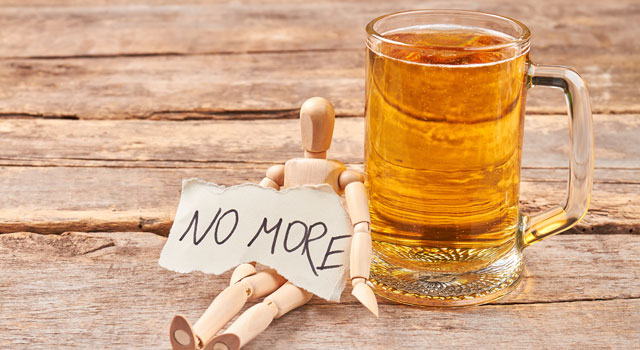In early recovery, it can be tempting to look for alternatives to drugs or alcohol. Some people may begin using tobacco more frequently, drinking more caffeine, or looking for supplements that might give a slight buzz or “pick-me-up.” This is because addiction is also a habit of just “doing” something frequently, leading to people looking for replacements for one’s old habit of using drugs or alcohol. Many people in early recovery ask about non-alcoholic beer and many people even assume non-alcoholic beer is made for people in recovery. This is not true and can even put one’s recovery at risk.
Another reason people want to try non-alcoholic beer is because they want to feel more involved at events that serve alcohol. Parties, new year’s, family reunions: these can all be tempting times to drink, so non-alcoholic beer seems like a good option. It is a better idea to find a different alternative for these events.
There are several reasons that make non-alcoholic beer dangerous for a recovering alcoholic or addict. Though it is true that it is virtually impossible to get drunk from non-alcoholic beer, the drink itself can be an immense trigger, leading to strong cravings and relapse. Every person reacts differently, but for someone in recovery, the risk is just too great. There are plenty of healthier and safer alternatives for someone to feel “a part” of a gathering or party. These are some major reasons non-alcoholic beer is risky:
-
There is still a small alcohol content
To some people’s surprise, non-alcoholic beer still contains small amounts of alcohol. The ABV is around .5% on average, while a classic beer like Budweiser contains 5% ABV. This means it is nearly impossible to even really notice the effect of the alcohol but it does not mean it can not cause cravings. Many addiction experts believe even small amounts of alcohol will trigger “the allergy” that defines alcoholism. After consuming trace amounts of alcohol, one might find themselves easily rationalizing a stronger drink. Everyone reacts differently, but in early recovery, this is a major danger.
-
The taste
Non-alcoholic beer tastes exactly like normal beer. This can be a major trigger for someone in early recovery. The beer will taste the same but the effects of alcohol will not take place. This can cause frustration and craving for intoxication. Tasting beer can trigger euphoric recall, which is the memories of the good times of drinking. For an addict or alcoholic, part of the disease is having difficulty remembering or acknowledging all of the negative consequences of active addiction. When cravings are intense this even truer. It best to shy away from drinks or foods that may taste like alcohol.

-
Placebo effect
Some people even report having a placebo effect of intoxication after drinking non-alcoholic beer. This means though not actually drunk, the individual may perceive feelings of intoxication. This can cause powerful cravings for more. As mentioned above, many alcoholics exhibit an “allergy,” defined by an overwhelming craving for alcoholic that makes it nearly impossible to stop drinking after the first drink. Many alcoholics exhibit this behavior, making a placebo effect extremely dangerous. The feelings of intoxication can result in complete disregard of the past or negative consequences and lead to real relapse.
What About Alternatives?
To play it safe, there are much better alternatives to alcohol that can help someone not feel left out of a party. Non-alcoholic beer holds too many risks. A popular phenomenon is what’s called a “mocktail.” Mocktails are pretty much what they sound like: a mock cocktail.
Mocktails are usually mixtures of juices, sodas, herbs, or anything that might be found in a normal cocktail. These drinks can be fun, taste great, and even look like cocktails. This means that for someone that might be still uncomfortable talking about recovery can still appear they are drinking a normal cocktail. In early recovery, it can seem awkward to tell people that you don’t drink, so this gives an easy alternative to avoid awkward conversations (eventually it won’t be awkward, don’t worry!).
Mocktails are much safer for several reasons. For one, there is no alcohol in them whatsoever. There is no risk for the allergy kicking in. Second, they do not taste like alcohol at all. Mocktails taste delicious just like any smoothie or virgin frozen cocktail. Third, it’s extremely unlikely that one will feel any type of placebo from a mocktail. A mocktail looks like a cocktail and it ends there. Non-alcoholic beer contains the same ingredients as real beer, meaning that they still taste like hops, which is a major cause of placebo.
In the end, there are way too many alternatives and way too many risks to consider non-alcoholic beer. If recovery is important to you, there are not many good reasons to try non-alcoholic beer. Besides, I have never heard of many good tasting non-alcoholic beers, so you won’t be missing out on much.
Seeking Treatment for Alcoholism and Addiction
If you or a loved one has a problem with alcoholism or addiction and want to experience recovery in a thriving community with lots of people just like you, then call the professionals at Stout Street today at 866-722-7040. Our trained staff is standing by to take your call and help you in any way we can. We know how difficult of a decision this can be and we know what it takes to ensure you find your own personal path in recovery. You no longer have to do it alone, so give us a call today and find the happy and sober life you’ve always dreamed of.
